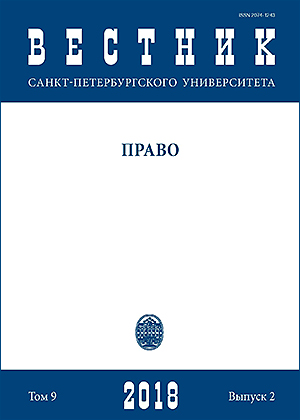Role of judicial interpretation in the process of stabilization of constitutional order in the Russian Federation
DOI:
https://doi.org/10.21638/11701/spbu14.2018.204Abstract
Providing the stability of the constitutional system is impossible without a unified understanding of the constitutional principles that underlie this constitutional order by all participants of legal relations. It is obvious that such unified understanding is achieved only through the establishment of united content standards established by the Constitutional Court of the Russian Federation during the procedure of a specialized constitutional interpretation. It is worth noting that the threat to the stability of the constitutional system can also be found in the contradictory or inadequate (lacunal) legal regulation of specific relations. In these circumstances, along with ordinary lawmaking, it is also possible to consider acts of the Supreme Court of the Russian Federation that generalize a diverse judicial practice, as a correct way of resolving the problem. The second aspect can arise when the existing national legislation is adjusted by supranational bodies that carry out judicial interpretation. Such a need to assess the constitutionality of the results of judicial interpretation allows to speak about the existence of a specific system of judicial interpretation, which in turn, helps to ensure the unification of the law enforcement process, and to ensure the rule of law as the main factor of stability of the constitutional system. The establishment of such a hierarchy of the results of judicial interpretation raises the issue not only about the “top of hierarchy”, but also about ensuring the stability of the entire system, as well as the stability and completeness of acts of interpretation, which are the named “top” of the system. It is obvious that, within the framework of the national legal order, the interpretation exercised by the Constitutional Court of the Russian Federation should be regarded as a higher priority. At the same time, the real assurance of compliance of all subordinate forms of judicial interpretation with the constitutional requirements, as well as the compliance of the interpretation of the Constitutional Court of the Russian Federation with the Constitution of the Russian Federation, is achieved by the use of a specific method of the judicial interpretation, implementation by the Constitutional Court of the Russian Federation.
Keywords:
judicial interpretation, constitutional interpretation, limits of constitutional interpretation, methodology of judicial interpretation, stability of constitutional order
Downloads
References
Downloads
Published
How to Cite
Issue
Section
License
Articles of "Vestnik of Saint Petersburg University. Law" are open access distributed under the terms of the License Agreement with Saint Petersburg State University, which permits to the authors unrestricted distribution and self-archiving free of charge.






